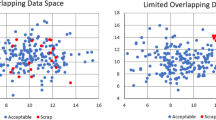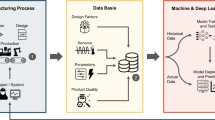Abstract
Quality control has long been one of the most challenging fields of manufacturing. The development of advanced sensors and the easier collection of high amounts of data designate the machine learning techniques as a timely natural step forward to leverage quality decision support and manufacturing challenges. This paper introduces an original dataset provided by the automotive supplier company VALEO, coming from a production line, and hosted by the École Normale Supérieure (ENS) Data Challenge to predict defects using non-anonymised features, without access to final test results, to validate the part status (defective or not). We propose in this paper a complete workflow from data exploration to the modelling phase while addressing at each stage challenges and techniques to solve them, as a benchmark reference. The proposed workflow is validated in series of experiments that demonstrate the benefits, challenges and impact of data science adoption in manufacturing.
Access this chapter
Tax calculation will be finalised at checkout
Purchases are for personal use only
Similar content being viewed by others
References
Wuest, T., Weimer, D., Irgens, C.: Machine learning in manufacturing: advantages, challenges, and applications. J. Prod. Manuf. Res. 4(1), 23–45 (2016)
Baturynska, I.: Statistical analysis of dimensional accuracy in additive manufacturing considering STL model properties. J. Adv. Man. Tech. 97(5), 2835–2849 (2018)
Pham, D.T., Afify, A.A.: Machine-learning techniques and their applications in manufacturing. Procs. IMechE Part B: J. Eng. Manuf. 219(5), 395–412 (2005)
Kusiak, A.: Data mining: manufacturing and service applications. Int. J. Prod. Res. 44(18–19), 4175–4191 (2006)
Auschitzky, E., Hammer, M., Rajagopaul, A.: How big data can improve manufacturing. McKinsey Company 822 (2014)
Feldkamp, N., Bergmann, S., Strassburger, S.: Knowledge discovery in manufacturing simulations. In: 3rd ACM SIGSIM Advanced Discrete Simulation, pp. 3–12 (2015)
Zhang, D., Xu, B., Wood, J.: Predict failures in production lines: a two-stage approach with clustering and supervised learning. Big Data 2016, 2070–2074. IEEE (2016)
Bosch. Production line performance (2016)
École Normale Supérieure of Paris and Collège de France. Challenge data (2020). https://challengedata.ens.fr/challenges/year/2020
Paolanti, M., Romeo, Felicetti et al: Machine learning approach for predictive maintenance in industry 4.0. In: 14th IEEE/ASME MESA, pp. 1–6. IEEE (2018)
Narciso, D.A.C., Martins, F.G.: Application of machine learning tools for energy efficiency in industry: a review. Energy Rep. 6, 1181–1199 (2020)
Brunton, S.L., Noack, B.R., Koumoutsakos, P.: Machine learning for fluid mechanics. Annu. Rev. Fluid Mech. 52, 477–508 (2020)
Candanedo, I.S., Nieves, E.H., González, S.R., Martín, M.T.S., Briones, A.G.: Machine learning predictive model for industry 4.0. In: Uden, L., Hadzima, B., Ting, I.-H. (eds.) Knowledge Management in Organizations, KMO 2018. CCIS, vol. 877, pp. 501–510. Springer, Cham (2018). https://doi.org/10.1007/978-3-319-95204-8_42
Peres, R.S., Barata, J., Leitao, P., Garcia, G.: Multistage quality control using machine learning in the automotive industry. IEEE Access 7, 79908–79916 (2019)
Thomas, L.C., Crook, J., Edelman, D.: Credit Scoring and Its Applications. Society for Industrial and Applied Mathematics, USA (2002)
Kerber, R.: Chimerge: Discretization of numeric attributes. In: AAAI 92 Proceedings of the 10th National Conference on Artificial Intelligence, pp. 123–128. AAAI Press (1992)
Fayyad, U.M., Irani, K.B.: Multi-interval discretization of continuous-valued at-tributes for classification learning. In: IJCAI, pp. 1022–1029 (1993)
Hothorn, T., Hornik, K., Zeileis, A.: Unbiased recursive partitioning: a conditional inference framework. J. Comp Graph. Stat. 15(3), 651–674 (2006)
Navas-Palencia, G.: Optimal binning: mathematical programming formulation. CoRR,abs/2001.08025 (2020)
Friedman, J.H.: Greedy function approximation: a gradient boosting machine. Ann. Stat. 1189–1232 (2001)
Breiman, L., Friedman, J.H., Olshen, R.A., Stone, C.J.: Classification and Regression Trees. Wadsworth and Brooks, Monterey, CA (1984)
Burges, C.J.C.: From Ranknet to LambdaRank to LambdaMART: an overview. Learning 11(23–58), 81 (2010)
Chen, T., Guestrin, C.: XGBoost: a scalable tree boosting system. In: Proceedings of the 22nd ACM SIGKDD International Conference on Knowledge Discovery and Data Mining, pp. 785–794 (2016)
Li, J., Cheng, K., Wang, S., Morstatter, F., Trevino, R.P., Tang, J., Liu, H.: Feature selection. ACM Comput. Surv. 50(6), 1–45 (2018)
Brown, C.D., Davis, H.T.: Receiver operating characteristics curves and related decision measures: a tutorial. Chems. Intell. Lab. Sys. 80(1), 24–38 (2006)
Acknowledgment
The authors thank VALEO for providing access to ENS Challenge dataset, the SAFI consortium for the opportunity to collaborate, and the following VALEO colleagues for the valuable discussions and presentations: Aitor Gonzalez, Miroslav Zima, Romain Delente, Aurele Pilloud-Passin, Benoit Veger, Fabrice Blasenhauer, Jean-Jacques Lopez, Remi Laronde, Sebastien Odouard, Stephane De-Clercq, Stephane Wysocki.
Author information
Authors and Affiliations
Corresponding author
Editor information
Editors and Affiliations
Rights and permissions
Copyright information
© 2022 The Author(s), under exclusive license to Springer Nature Switzerland AG
About this paper
Cite this paper
Khalfaoui, S. et al. (2022). Defect Prediction on Production Line. In: Jansen, T., Jensen, R., Mac Parthaláin, N., Lin, CM. (eds) Advances in Computational Intelligence Systems. UKCI 2021. Advances in Intelligent Systems and Computing, vol 1409. Springer, Cham. https://doi.org/10.1007/978-3-030-87094-2_47
Download citation
DOI: https://doi.org/10.1007/978-3-030-87094-2_47
Published:
Publisher Name: Springer, Cham
Print ISBN: 978-3-030-87093-5
Online ISBN: 978-3-030-87094-2
eBook Packages: Intelligent Technologies and RoboticsIntelligent Technologies and Robotics (R0)




